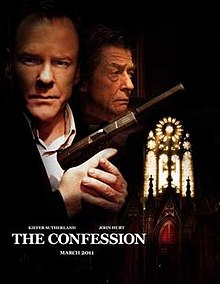
Confession, in many religions, is the acknowledgment of one's wrong thoughts and actions (sins). This may occur directly to a god, to fellow people, or to a person acting as a mediator for a god.

Penance is any act or a set of actions done out of repentance for sins committed, as well as an alternate name for the Catholic, Lutheran, Eastern Orthodox, and Oriental Orthodox sacrament of Reconciliation or Confession. It also plays a part in confession among Anglicans and Methodists, in which it is a rite, as well as among other Protestants. The word penance derives from Old French and Latin paenitentia, both of which derive from the same root meaning repentance, the desire to be forgiven. Penance and repentance, similar in their derivation and original sense, have come to symbolize conflicting views of the essence of repentance, arising from the controversy as to the respective merits of "faith" and "good works". Word derivations occur in many languages.

Kiefer William Frederick Dempsey George Rufus Sutherland is a Canadian actor and musician. He is best known for his starring role as Jack Bauer in the Fox drama series 24, for which he won an Emmy Award, a Golden Globe Award, two Screen Actors Guild Awards, and two Satellite Awards.
Johannes Junius was the mayor of Bamberg, and a victim of the Bamberg witch trials, who wrote a letter to his daughter from jail while he awaited execution for witchcraft.

A confessional is a box, cabinet, booth, or stall in which the priest in some Catholic churches sits to hear the confessions of penitents. It is the usual venue for the sacrament in the Roman Catholic Church and the Lutheran Churches, but similar structures are also used in Anglican churches of an Anglo-Catholic orientation. In the Catholic Church, confessions are only to be heard in a confessional or oratory, except for a just reason.
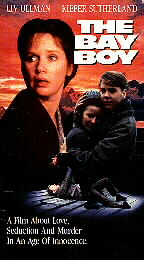
The Bay Boy is a 1984 Canadian drama film. It is a semi-autobiographical film based on director Daniel Petrie's experiences of growing up in Glace Bay, a mining town on Cape Breton Island, during the Great Depression. It features the screen debut of Kiefer Sutherland as the film's central character, alongside Liv Ullmann as his character's mother.
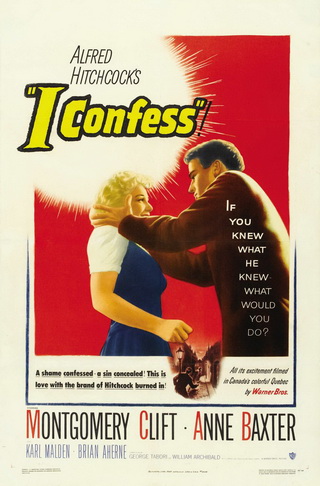
I Confess is a 1953 American film noir directed by Alfred Hitchcock, starring Montgomery Clift as Catholic priest Father Michael William Logan, Anne Baxter as Ruth Grandfort, and Karl Malden as Inspector Larrue.
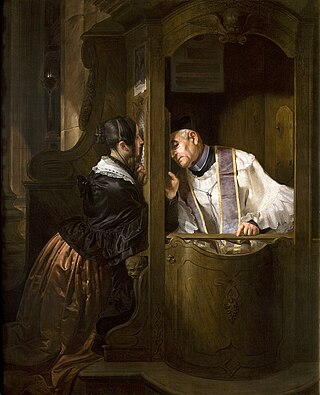
Absolution is a theological term for the forgiveness imparted by ordained Christian priests and experienced by Christian penitents. It is a universal feature of the historic churches of Christendom, although the theology and the practice of absolution vary between Christian denominations.
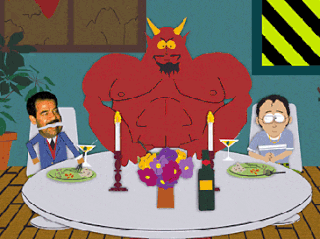
"Do the Handicapped Go to Hell?" is the ninth episode of the fourth season of the animated television series South Park, and 57th episode of the series overall. Going by production order, it would be 10th episode of Season 4. "Do the Handicapped Go to Hell?" originally aired in the United States on July 19, 2000, on Comedy Central. It is the first part of a two-parter, which concludes in the following episode "Probably." The story links some of the events and characters of the film South Park: Bigger, Longer & Uncut into the animated series. The episode is rated TV-MA in the United States.
In the Catholic Church, the Seal of Confession is the absolute duty of priests or anyone who happens to hear a confession not to disclose anything that they learn from penitents during the course of the Sacrament of Penance (confession). Even where the seal of confession does not strictly apply – where there is no specific serious sin confessed for the purpose of receiving absolution – priests have a serious obligation not to cause scandal by the way they speak.
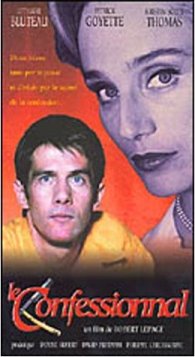
The Confessional is a 1995 mystery-drama film directed by Robert Lepage.
The clergy–penitent privilege, clergy privilege, confessional privilege, priest–penitent privilege, pastor–penitent privilege, clergyman–communicant privilege, or ecclesiastical privilege, is a rule of evidence that forbids judicial inquiry into certain communications between clergy and members of their congregation. This rule recognises certain communication as privileged and not subject to otherwise obligatory disclosure; for example, this often applies to communications between lawyers and clients. In many jurisdictions certain communications between a member of the clergy of some or all religious faiths and a person consulting them in confidence are privileged in law. In particular, Catholics, Lutherans and Anglicans, among adherents of other Christian denominations, confess their sins to priests, who are unconditionally forbidden by Church canon law from making any disclosure, a position supported by the law of many countries, although in conflict with civil (secular) law in some jurisdictions. It is a distinct concept from that of confidentiality.
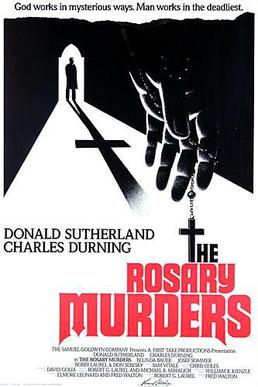
The Rosary Murders is a 1987 American mystery crime film directed by Fred Walton and starring Donald Sutherland, Charles Durning, Belinda Bauer, and Josef Sommer. Its plot follows a series of gruesome murders occurring within a Detroit Roman Catholic parish. It is based upon the 1979 novel of the same name by William X. Kienzle. Kienzle received screenplay credit, as did Elmore Leonard.
The Sacrament of Penance is one of the seven sacraments of the Catholic Church, in which the faithful are absolved from sins committed after baptism and reconciled with the Christian community. During reconciliation mortal sins must be confessed and venial sins may be confessed for devotional reasons. According to the dogma and unchanging practice of the church, only those ordained as priests may grant absolution.
The Seal of the Confessional is a principle within Anglicanism which protects the words spoken during confession. Confession has certain censures on disclosure as there is an understanding among the clergy that there is an inviolable confidence between the individual priest and the penitent. This principle should not be confused with the rarer practice of lay confession, nor with the public confession of sins which is an element of most eucharistic liturgies throughout the Anglican Communion. The "Seal of the Confessional" refers specifically to the private confession of sins by an individual, in the presence of a priest, the form of which is regulated by the 1662 Book of Common Prayer and later liturgical sources.
Priest–penitent privilege in France and the western portion of Europe received public recognition at a very early date owing to the perceived sacredness of the Seal of the Confessional.
Lay confession is confession in the religious sense, made to a lay person.

Absolution is a 1978 British thriller film directed by Anthony Page and written by playwright Anthony Shaffer. The film stars Richard Burton as a priest who teaches at a boys' school and finds one of his favourite students is playing a nasty practical joke on him. He sets out to investigate the prank and stumbles upon a dead body, leading to his life spiralling out of control.

In the Lutheran Church, Confession is the method given by Christ to the Church by which individual men and women may receive the forgiveness of sins; according to the Large Catechism, the "third sacrament" of Holy Absolution is properly viewed as an extension of Holy Baptism.

A confession is a statement – made by a person or by a group of persons – acknowledging some personal fact that the person would ostensibly prefer to keep hidden. The term presumes that the speaker is providing information that he believes the other party is not already aware of, and is frequently associated with an admission of a moral or legal wrong:
In one sense it is the acknowledgment of having done something wrong, whether on purpose or not. Thus confessional texts usually provide information of a private nature previously unavailable. What a sinner tells a priest in the confessional, the documents criminals sign acknowledging what they have done, an autobiography in which the author acknowledges mistakes, and so on, are all examples of confessional texts.
